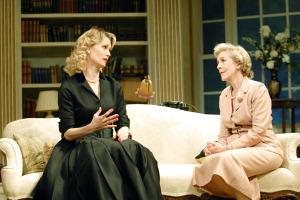Relative Values - Review
Just last month Trevor Nunn directed quite possibly the worst new play in London when he brought a stage version of the 1987 film Fatal Attraction to the Theatre Royal, Haymarket, adapted by its original screenplay writer James Dearden. Now, just around the corner from the Haymarket at the Harold Pinter Theatre in Panton Street, he is directing quite possibly the most painful and pointless revival in London in Noel Coward's socially awkward and antiquated 1951 play Relative Values.
Nunn, one of our very best theatre directors who once ran both the RSC and National Theatres and was responsible for the original productions of such megamusicals as Cats and Les Miserables, could probably do these jobs in his sleep, and perhaps he did. I was tempted to nod off several times during Relative Values, which turns the clock back so determinedly to another era of drawing room comedies that I felt as if I was in a theatrical time machine. "A comedy of manners quickly becomes obsolete when there are no manners," says one character here, offering the playwright's own diagnosis of his play's problems.
It's not just that the play is so dated as to feel beyond reach; it's also that the production, too, is so resolutely old-fashioned and stodgy. The curtain goes up on a very handsome drawing room in a country pile. The publicity image on the front of the programme specifically invokes the world of Downton Abbey. But would that the wit and intrigue here were on a level with Julian Fellowes's script for that.
Instead, across nearly three hours we are asked to concern ourselves with the machinations of a grinding plot in which Patricia Hodge's countess of Marshwood House in Kent has to worry about the plans of her son Nigel, the Earl of Marshwood, to marry a Hollywood starlet called Miranda Frayle. Except that Miranda isn't who she seems to be: she was actually born in Sidcup and is the long-estranged sister of the Countess's own maid Moxie. Oh, what larks!
Except that I'm afraid I couldn't give two hoots. My partner commented at the end, "There were about 17 seconds of pleasure in that." I reckon he over-estimated. I'd be sorely tempted to give it just a one-star review, were it not for the bravura efforts of a company who gamely soldier on through it all and try to inject some energy in it.
It's not the fault of the elegant, graceful Patricia Hodge as the Countess, the neatly restrained Rory Bremner making his acting stage debut as house butler Crestwell, and the appealing Caroline Quentin as ladies' maid Moxie that they are ultimately defeated by the play. Leigh Zimmerman, who won an Olivier Award last year for her performance in A Chorus Line, also gives a good turn as the Hollywood star. But though she makes the proceedings more elegant, she can't make it more interesting. You'd be far better off investing in a ticket to the other Coward revival in town of Blithe Spirit.
"This is the kind of unashamedly frivolous play that doubtless helped turn John Osborne into an angry young man but it is likely to provide nothing but pleasure to those who admire Coward's wit and stylish insouciance."
Charles Spencer for The Telegraph
"While there's much pleasure to be had from the stylish acting and direction, Coward's play remains a musty, tribal relic in praise of the class system."
Michael Billington for The Guardian
"It's impossible not to be amused by Hodge's silkily imperious tone as she tries to ensure the upper classes remain unsullied by such an arriviste."
Fiona Mountford for The Evening Standard
External links to full reviews from popular press
- Telegraph - Guardian
Originally published on
